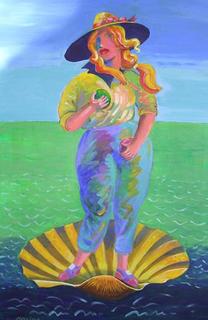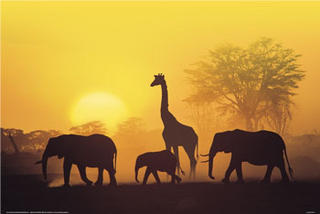
Hello once again, dear readers. Today we have an interesting mix : (P1) Political begins with my identification with giraffes. (P2) Poetical contains my satirical poem
Torture. (P3) Philosophical is Michele Anna Jordan's column on loss, hunger and hotdogs.
(P1) Political
A Few Notes About Giraffes
I’ve always been fascinated by giraffes. For years, people gave me giraffe statues, pictures, etc. Joyce opined that it’s probably because I’m willing to stick my neck out ( eg. send out manuscripts, post my opinions, publish a blog, etc.)
I also like to think it may have something to do with having my head well above the fray and surveying all I see below - seeing things ahead of time – like my poem Torture which I wrote long before Iraq, actually when the US was first going after Bin Laden in Afghanistan, and there was a growing sympathy for using stronger “persuasive” measures.
Abu Ghraib and Guantanamo 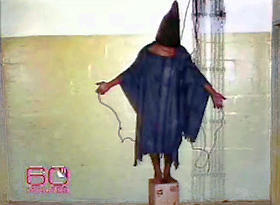 later proved me out. Now I’m reluctant to send the poem out for publication. It’s no longer prophetic. Almost a statement of the obvious. But when I wrote it in 2002 or 2003, I felt I wouldn’t be surprised if….. but I was surprised anyway. Surprised and very disappointed with the government that purports to stand for all that I believe in, especially human freedom and dignity.
later proved me out. Now I’m reluctant to send the poem out for publication. It’s no longer prophetic. Almost a statement of the obvious. But when I wrote it in 2002 or 2003, I felt I wouldn’t be surprised if….. but I was surprised anyway. Surprised and very disappointed with the government that purports to stand for all that I believe in, especially human freedom and dignity.
As to being a giraffe, I’d really like to think it has something to do with being a quiet observer. But I guess that’s not to be. Please ask me to stop if you feel, like I do at times, that I’m sounding like a big empty barrel rattling and roaring down the road.
(P2) Poetical
Here’s my poem from somewhere around early 2003:
Torture
I want to pitch a new reality TV show.
It will be called simply,
“How Much Can You Take?”
Millions of Americans will watch and countenance
Round after round of escalating degrees of torture
Inflicted upon willing contestants,
Eager participants from all levels of American life
Juiced on the fame and hope of winning
The million dollar grand prize
For withstanding the nine levels of hellish torment.
No prizes for those who reveal anything,
Even emotion will go unpaid.
Now here’s the big “twist”:
From another pool of carefully screened guests
Emerges this week’s “Grand Torturer;”
In return for his or her prowess and success
He/She (actually, test audiences have preferred females)
Will win Carnival Cruises, home entertainment centers,
Ultimately even a brand new Cadillac Escalade
By extracting interesting and titillating information
From their cash-hungry torture subjects.
Think of the fun, the appeal to virtually all the senses.
The visuals beginning with the older light-hearted
Pillories of Olde England where crowds of spectators
Seize the opportunity to also participate by tossing
Insults, feces, stones and whatever else they can find.
Then we see things move up to other quaint antiquities
Like the stretching rack or the iron maiden.
In spite of the fact that familiarity breeds boredom,
More modern methods from “The Electrical Age” –
-the genital and nipple shocks- can be
Spiced by punked-up body piercers encouraged
To release all restraint from their imaginations.
And these are only the first two of the nine Dantesque levels of pain!
I need not go on except to anticipate your next question:
“What,” you ask, “happens
Should a contestant fail to recover, even after,
Half an episode’s attention paid to heroic efforts at resuscitation?”
Well, here’s a beautiful thing:
We budget for that with a double-indemnity prize,
Two Million Dollars! Paid posthumously
On the air the following week
To the late contestant’s grieving but grateful family.
I recommend one of those huge faux checks
Held jointly by the family, our emcee and
The President of The Fox Network.
What do you think, America?
And, of course,
Will you support our fine sponsors?
(Edward Coletti – 2003)
(P2) Philosophical
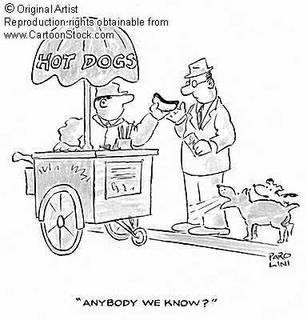
Whenever Patti, Joyce or I muse about something vaguely spritual, my friend Norm says that, in a future life, he plans to return as a hot dog. I should add that Norm is a very talented cook. Imagine my surprise in reading the following Santa Rosa Press Democrat column by food editor Michele Anna Jordan in which she deftly intertwines the subjects of loss, hunger, and hot dogs.
Existential crisis, heartbreak, and a hunger for hot dogs
July 6, 2005
By MICHELE ANNA JORDAN
FOR THE PRESS DEMOCRAT
One of the most important things anyone has ever said to me was, "So you like hot dogs."
It was a professor at Sonoma State University who was speaking, and I am fairly certain he was near the end of his tether with me and what I will call my existential crisis.
For reasons unimportant to our purposes here, I was grappling with life's biggest questions and getting nowhere. Nothing made sense. A feeling of absurdity enveloped me like morning fog that never seemed to lift.
"So you like hot dogs," he finally shrugged one afternoon, "and you make that your reason for living."
Having not yet discovered the New York hot dog, I immediately substituted watermelon, and for a long time, I let it be enough.
So much wisdom is contained in those five words that they have sustained me in times of trouble, doubt, crisis, despair, heartbreak and loss.
They have worked on me like a Zen koan, a magic spell, a passage from the Torah, the Bible, the Quran. I mean no disrespect to any of these traditions; the words were profound and profoundly effective.
The fog lifted.
How, you ask, can you let a hot dog -- or even watermelon -- be a reason for living?
It's easy. Even in times of devastating loss, our bodies eventually awaken, shaken gently by an irresistible desire to eat something that tastes good. If, in the midst of despair, you can remember this, you're halfway there.
What the professor was doing, really, was stripping away everything except the simple reality that we are connected to the world by our senses. In the end, taste and its persistent midwife, hunger, can bring us back to ourselves, over and over again, even when we think we have lost our way. We do not have to find our way back on our own. Hunger does it for us.
Of course, hunger abandons us now and then. In times of devastating loss, its message is eclipsed by shock, by sadness, by grief. Hunger's message does not get through to us, although I always imagine it is trying to be heard. That's why one of the traditions of death is to feed the family. People arrive with food for the bereaved and often stay to usher the meal along.
"You must eat something," we say, often to odd looks and protests.
Yet in the end, protests usually resolve into comments like, "I didn't know I was hungry," "I actually feel a little better," and "Thank you," whispered with a sigh.
In the past few weeks hunger has abandoned me, returned solo, without its handmaiden, taste, and flitted away again. I have done a lousy job of feeding myself and have made little effort to feed others.
Late the other night, the professor's words returned. "So you like hot dogs," I could hear him say.
At midnight, I made scrambled eggs with Bellwether Papato and DaVero Sparklers, a dried and shredded chile. I added my favorite black pepper and a little kosher salt and ate it slowly with a glass of Benzinger 1999 Pinot Noir alongside.
It was so good that I cried. "Welcome home, hunger," I said out loud; "taste, old friend, it's been too long."
Today is my birthday. As I savored that simple late night feast, I decided that what I most wanted to do to celebrate this year is to cook for friends. I just hope they're hungry, too.
Please comment here (choose "other" as your identity when asked)
or, if you prefer, please email me at
edcoletti@sbcglobal.net
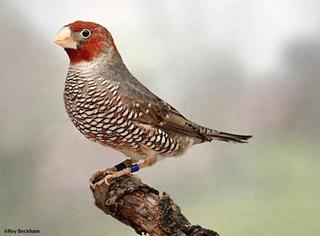 (P1) Poetical
(P1) Poetical


